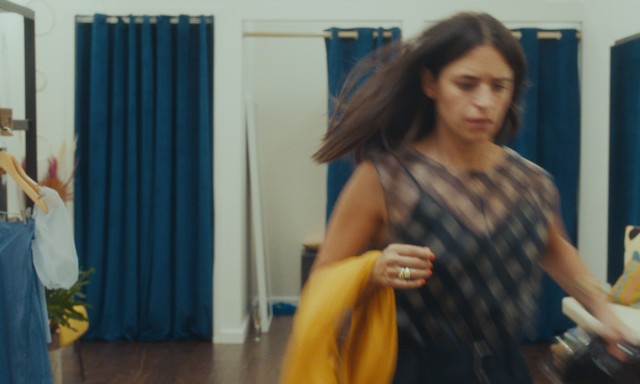What starts as a regular workday for Diana, at the busy store where she is a sales associate, quickly takes a turn when she thinks that she overhears a nonconsensual sexual encounter in a dressing room. In Sales Per Hour, directors, Daniel Jaffe (The Ultimate (by Lou Fescano)) and Michelle Uranowitz explore a morally confusing situation that will make their protagonist question who she should trust, leaving her helpless in her decision of how to react.
“The script was born out of this decision, wondering what was at stake for everyone that day.”
Sales Per Hour is actually based on Uranowitz’s own experience working in retail. Confronted with the exact same situation, Jaffe explains how his co-director found herself “racked with uncertainty and fearful of the consequences for her career”. Penned by Uranowitz, the script was born out of her decision not to intervene, leaving her wondering “what was at stake for everyone that day”.
The film’s central theme revolves around the protagonist’s conviction that she witnessed an assault, juxtaposed with the awareness of the personal and professional risks involved in reporting it. This tension creates an uncomfortable dilemma, where she is unsure about the appropriate course of action. “We wanted to dig into the factors that hold us back from stepping into an uncomfortable situation, and how we become complicit bystanders in circumstances like assault”, Jaffe added.
Told entirely from Diana’s perspective, the film starts with an infectious energy, as we get to know this sales associate and the bustling, results-driven environment she works in. Her passion for her job is evident, and in its workplace setting, the film initially starts on a light tone, with the sound design and the camera movements reflecting that by immersing the audience in the lively ambiance of the store. However, there is a tonal switch after she witnesses the assault, with the anxiety of the moment conveyed through the editing, she never feels like she is really given the time to speak up.

“In tandem with the chaos of overlapping dialogue, we wanted the film to physically move a lot as well” – Jaffe discussing the approach to production.
With the dressing room assault happening in the first four minutes of the film, the remainder of the seven minute short then focuses on Diana grappling with what has happened. As she tries to remain professional, she’s struck with a sense of guilt for her lack of response in this troubling situation. Left with her own feelings, the sound design becomes super quiet, and while the imagery remains colorful and bright, the silence reflects the bleakness of her thoughts. It’s a subtle change, but along with the performance, it provides a stark contrast to the happy customer service energy she had in the first scene.
While Jaffe, also credited as an editor of the film alongside Cecilia Delgado, gives the film a rhythm that immerses the audience in Diana’s state of mind, it is Uranowitz’s (who in addition to being the writer and co-director of the film, is also the lead actor) performance that captures the subtlety of the screenplay. In the second part of the film, as her character navigates confusion, guilt and despair, she is truly impressive in the complex emotions that she manages to portray. Ultimately, it’s her journey that anchors the film narratively, and Uranowitz, without resorting to unnecessary dialogue, brings it to the screen with her remarkable and poignant performance.
Sales Per Hour had its World Premiere at the 2021 edition of SXSW and went on to have a great festival run, including stops at the Palm Springs ShortFest and AFI, before debuting online as a Vimeo Staff Pick. Jaffe and Uranowitz are now working on feature versions of both The Ultimate (by Lou Fescano) and Sales Per Hour.

 Céline Roustan
Céline Roustan